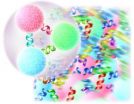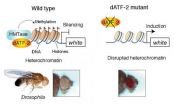(Press-News.org) EDITOR'S PICK: What makes a happy meal?
Many people when stressed turn to high calorie "comfort foods". Despite the contribution this behavior makes to the current obesity epidemic, little is known about the molecules and nervous system circuits that control it. Insight into this could provide new targets for the development of therapeutics to curb this potentially detrimental behavior. In this context, a team of researchers, led by Jeffrey Zigman, at The University of Texas Southwestern Medical Center, Dallas, working with a new mouse model of prolonged psychosocial stress that features aspects of major depression and posttraumatic stress disorder, has now found that the hormone ghrelin is required for prolonged psychosocial stress to promote preference for and intake of high-fat food. Further analysis revealed the nervous system circuits that mediate these effects of ghrelin. The team hopes that further studies will provide additional insight into the control of stress-induced food-reward behavior and identify additional therapeutic targets.
TITLE: Ghrelin mediates stress-induced food-reward behavior in mice
AUTHOR CONTACT:
Jeffrey M. Zigman
The University of Texas Southwestern Medical Center, Dallas, Texas, USA.
Phone: 214.648.8621; Fax: 214.648.5612; E-mail: jeffrey.zigman@utsouthwestern.edu.
View this article at: http://www.jci.org/articles/view/57660?key=92aa9a3cef83bc411330
EDITOR'S PICK: Understanding the antiepileptic benefits of an Atkins-like diet
Some individuals with epilepsy fail to respond to treatment with conventional drugs but benefit from consuming a ketogenic diet — a high-fat, low-carbohydrate diet similar to the more commonly known Atkins diet. A team of researchers, led by Detlev Boison, at the Legacy Research Institute, Portland, has now identified in mice the molecular mechanism responsible for the antiepileptic effects of the ketogenic diet.
The team found that a ketogenic diet reduces seizures in mice by decreasing expression of the protein Adk, which is responsible for clearing the natural antiepileptic agent adenosine from the brain. The clinical relevance of these data are highlighted by the team's finding that brain tissue from patients with epilepsy that fails to respond to treatment with conventional drugs shows increased levels of Adk. The team suggests that their data could lead to the development of less-restrictive antiepileptic diets and alternate pharmaceutical approaches to treatment, notions with which Robert Greene, at The University of Texas Southwestern Medical Center, Dallas, concurs in an accompanying commentary.
TITLE: A ketogenic diet suppresses seizures in mice through adenosine A1 receptors
AUTHOR CONTACT:
Detlev Boison
Legacy Research Institute, Portland, Oregon, USA.
Phone: 503.232.0589; Fax: 503.232.5465; E-mail: dboison@downeurobiology.org.
View this article at: http://www.jci.org/articles/view/57813?key=b823f84a9a31512e6849
ACCOMPANYING COMMENTARY
TITLE: Adenosine: front and center in linking nutrition and metabolism to neuronal activity
AUTHOR CONTACT:
Robert W. Greene
The University of Texas Southwestern Medical Center and Dallas VA Medical Center, Dallas, Texas, USA.
Phone: 214.648.5108; Fax: 214.648.7037; E-mail: robertw.greene@utsouthwestern.edu.
View this article at: http://www.jci.org/articles/view/58391?key=dc1ba8608a2fa737a42f
EDITOR'S PICK: "Good" cholesterol function as important as its levels
High levels of "good" cholesterol (HDL cholesterol) are associated with a decreased risk of coronary artery disease (CAD) — a disease of the major arterial blood vessels that is one of the major causes of heart attack and stroke. This suggests that therapeutics that increase HDL levels could be clinically useful. However, such therapies have not yielded clear-cut decreases in disease, indicating that the beneficial effects of HDL are likely not related simply to its abundance. More evidence to support this notion has now been provided by a team of researchers, led by Ulf Landmesser, at the University of Zurich, Switzerland, who found that HDL from patients with (CAD) had different effects on cells lining blood vessels than did HDL from healthy individuals. In particular, the HDL from patients with CAD was found to lack anti-inflammatory effects on blood vessel–lining cells and could not stimulate repair of the blood vessel lining. As noted by the team and, in an accompanying commentary, Philip Shaul and Chieko Mineo, at The University of Texas Southwestern Medical Center, Dallas, these data indicate that if the protective potential of HDL is to be harnessed, its biological functions as well as its abundance must be considered.
TITLE: Mechanisms underlying adverse effects of HDL on eNOS-activating pathways in patients with coronary artery disease
AUTHOR CONTACT:
Ulf Landmesser
University of Zurich, Zurich, Switzerland.
Phone: 0041.44.255.9595; Fax: 0041.44.255.4251; E-mail: Ulf.Landmesser@usz.ch.
View this article at: http://www.jci.org/articles/view/42946?key=75b59fdbec4a2b72920d
ACCOMPANYING COMMENTARY
TITLE: PON-dering differences in HDL function in coronary artery disease
AUTHOR CONTACT:
Philip W. Shaul
The University of Texas Southwestern Medical Center, Dallas, Texas, USA.
Phone: 214.648.2015; Fax: 214.648.2096; Email: Philip.shaul@utsouthwestern.edu.
View this article at: http://www.jci.org/articles/view/57671?key=80dc6616a66c3edf5371
PULMONARY: New cell population repairs the damaged lung
A team of researchers, led by Harold Chapman and Thiennu Vu, at the University of California San Francisco, San Francisco, has identified a previously unrecognized population of cells in the lungs of mice (alveolar epithelial cells expressing alpha-6-beta-4) and determined that these cells serve as multipotent progenitors during repair of the severely injured lung. The importance of these data for the development of regenerative therapies for the treatment of lung disease is touched upon by the authors and discussed in more detail in an accompanying commentary by Jeffrey Whitsett and Vladimir V. Kalinichenko, at Cincinnati Children's Hospital Medical Center, Cincinnati.
TITLE: Integrin alpha-6-beta-4 identifies an adult distal lung epithelial population with regenerative potential in mice
AUTHOR CONTACT:
Harold A. Chapman
University of California San Francisco, San Francisco, California, USA.
Phone: 415.514.0896; Fax: 415.502.4995; E-mail: hal.chapman@ucsf.edu.
Thiennu H. Vu
University of California San Francisco, San Francisco, California, USA.
Phone: 415.514.4266; Fax: 415.514.4365; E-mail: thiennu.vu@ucsf.edu.
View this article at: http://www.jci.org/articles/view/57673?key=dc803dbbac57e655b34f
ACCOMPANYING COMMENTARY
TITLE: Integrin alpha-6-beta-4 defines a novel lung epithelial progenitor cell: a step forward for cell-based therapies for pulmonary disease
AUTHOR CONTACT:
Jeffrey A. Whitsett
Cincinnati Children's Hospital Medical Center and University of Cincinnati College of Medicine, Cincinnati, Ohio, USA.
Phone: 513.803.2790; Fax: 513.636.7868; E-mail: jeff.whitsett@cchmc.org.
View this article at: http://www.jci.org/articles/view/58704?key=627c5ee85d69eecc49a1
NEPHROLOGY: Long live dopamine production by the kidneys
Dopamine is a natural chemical in the body well known for its role in nerve cell communication; loss of dopamine-producing nerves in a specific region of the brain causes Parkinson disease. However, dopamine also exerts effects on other organs of the body, including the kidneys, where it modulates water transport. The dopamine that acts on the kidneys comes both from the circulation and from the kidneys themselves, which have the capacity to make the chemical, but the roles of these distinct sources of dopamine have not been determined. Raymond Harris, Ming-Zhi Zhang, and colleagues, at Vanderbilt University, Nashville, have now investigated this issue in mice and found that dopamine made within the kidneys is critical for maintaining normal blood pressure. As mice unable to make dopamine within their kidneys developed high blood pressure and lived for a much shorter length of time than normal mice, Harris and colleagues suggest that a functional dopaminergic system in the kidney is important for long-term health and survival.
TITLE: Intrarenal dopamine deficiency leads to hypertension and decreased longevity in mice
AUTHOR CONTACT:
Raymond C. Harris
Vanderbilt University School of Medicine and Nashville Veterans Affairs Hospital, Nashville, Tennessee, USA.
Phone: 615.322.2150; Fax: 615.343.2675; E-mail: ray.harris@vanderbilt.edu.
Ming-Zhi Zhang
Vanderbilt University Medical Center, Nashville, Tennessee, USA.
Phone: 615.343.1548; Fax: 615.343.2675; E-mail: ming-zhi.zhang@vanderbilt.edu.
View this article at: http://www.jci.org/articles/view/57324?key=6688c84a9626342f12f6
ONCOLOGY: Inflammation can initiate, not just promote, tumor development
Colorectal cancer is one of the most common forms of cancer worldwide. One of the factors that promotes the development of colorectal cancer is chronic inflammation of the gut. Now, a team of researchers, led by Manolis Pasparakis, at the University of Cologne, Germany, has determined that the NF-kappa-B signaling pathway, the predominant signaling pathway regulating the inflammatory response, not only promotes tumor development but can also initiate tumor formation in mice. While Pasparakis and colleagues did not perform any human studies, they suggest that their observations have relevance to human disease because a recent study has determined that genes that template components of the NF-kappa-B signaling pathway are frequently amplified in different types of cancer.
In an accompanying commentary, Thomas Wirth and Yoshiaki Sunami, at the University of Ulm, Germany, discuss the significance of the data generated by Pasparakis and colleagues and suggest that if the same is true in humans, it will provide a series of new therapeutic targets.
TITLE: Constitutive IKK2 activation in intestinal epithelial cells induces intestinal tumors in mice
AUTHOR CONTACT:
Manolis Pasparakis
University of Cologne, Cologne, Germany.
Phone: 49.221.470.1526; Fax: 49.221.470.5163; E-mail: pasparakis@uni-koeln.de.
View this article at: http://www.jci.org/articles/view/45349?key=ba9fa078d5a27928fa59
ACCOMPANYING COMMENTARY
TITLE: Intestinal carcinogenesis: IKK can go all the way
AUTHOR CONTACT:
Thomas Wirth
Institute of Physiological Chemistry, University of Ulm, Ulm, Germany.
Phone: 49.731.500.23270; Fax: 49.731.500.22892; E-mail: thomas.wirth@uni-ulm.de.
View this article at: http://www.jci.org/articles/view/58454?key=61a0190ca25f36fa6804
###
JCI table of contents: June 23, 2011
2011-06-24
ELSE PRESS RELEASES FROM THIS DATE:
When matter melts
2011-06-24
In its infancy, when the universe was a few millionths of a second old, the elemental constituents of matter moved freely in a hot, dense soup of quarks and gluons. As the universe expanded, this quark–gluon plasma quickly cooled, and protons and neutrons and other forms of normal matter "froze out": the quarks became bound together by the exchange of gluons, the carriers of the color force.
"The theory that describes the color force is called quantum chromodynamics, or QCD," says Nu Xu of the U.S. Department of Energy's Lawrence Berkeley National Laboratory (Berkeley ...
Effects of stress can be inherited, and here's how
2011-06-24
None of us are strangers to stress of various kinds. It turns out the effects of all those stresses can change the fate of future generation, influencing our very DNA without any change to the underlying sequence of As, Gs, Ts and Cs. Now, researchers reporting in the June 24th issue of Cell, a Cell Press publication, have new evidence that helps to explain just how these epigenetic changes really happen.
"There has been a big discussion about whether the stress effect can be transmitted to the next generation without DNA sequence change," said Shunsuke Ishii of RIKEN ...
How to Avoid Harm at the Doctor's Office After a Tampa Car Accident
2011-06-24
A doctor's office visit can be stressful, no matter what the circumstances, but imagine if you're visiting your doctor after you've been injured in a car accident.
If you've spoken with an attorney about your Florida motor vehicle accident, your attorney may have counseled you on how to protect your accident claim in the exam room. If you haven't spoken to an attorney, there are mistakes you want to avoid to prevent damaging any possible claim you have.
Mistakes to Avoid at a Visit With Your Doctor
Don't Lie About Your Pain or Ignore Pain: The most common, and ...
Leftover embryonic cells connect gastric reflux and cancer
2011-06-24
The ultimate source of some cancers is embryonic cells. Research published in the June 24th Cell, a Cell Press publication, traces the precursor of deadly esophageal cancers to leftover embryonic cells found in all adults.
Some people with gastric reflux disease have a greater risk of developing esophageal cancer. These patients often have Barrett's esophagus, a condition in which intestinal-like cells appear in the esophagus. Esophageal cancers are difficult to treat and, together with gastric adenocarcinomas, kill more than a million people each year.
"A lot of ...
The flames of Betelgeuse
2011-06-24
Betelgeuse, a red supergiant in the constellation of Orion, is one of the brightest stars in the night sky. It is also one of the biggest, being almost the size of the orbit of Jupiter — about four and half times the diameter of the Earth's orbit. The VLT image shows the surrounding nebula, which is much bigger than the supergiant itself, stretching 60 billion kilometres away from the star's surface — about 400 times the distance of the Earth from the Sun.
Red supergiants like Betelgeuse represent one of the last stages in the life of a massive star. In this short-lived ...
Mechanism for stress-induced epigenetic inheritance uncovered in new study
2011-06-24
Researchers at RIKEN have uncovered a mechanism by which the effects of stress in the fly species Drosophila are inherited epigenetically over many generations through changes to the structure of chromatin, the material that makes up the cell nucleus. Published in the journal Cell, the results highlight the role of the transcription factor dATF-2 in chromatin assembly, marking a major advance in our understanding of non-Mendelian inheritance.
Recent years have seen growing interest in the phenomenon of epigenetic inheritance: the idea that our genome, through epigenetic ...
Senators Latest Target: Smartphone DUI Apps
2011-06-24
An app created by the Canadian based creators of Blackberry, Research In Motion, has recently been pulled off the company's online store after a formal request from four U.S. Senators.
Known as the "DUI app," it allows users to pinpoint the exact locations of local police checkpoints using GPS. The apps also locate traffic cameras and speed traps.
Web applications like these, however, are gaining widespread attention by law enforcement and legislative officials across the country.
Senators Harry Reid, D-Nevada; Charles Schumer, D-New York; Frank Lautenberg, ...
Oxytocin promises hope in Prader-Willi syndrome
2011-06-24
Prader-Willi syndrome is a rare genetic disorder which affects one child in 25,000. Children born with this syndrome have a range of complex neurological and developmental problems which continue into adult life. These can manifest as cognitive and behavioral difficulties, weight gain, problems in controlling their temper and attendant difficulties in socialization. New research published in BioMed Central's open access journal Orphanet Journal of Rare Diseases, demonstrates that the hormone oxytocin is able to positively affect patients by improving trust, mood, and reducing ...
Synthetic collagen from maize has human properties
2011-06-24
Synthetic collagen has a wide range of applications in reconstructive and cosmetic surgery and in the food industry. For proper function in animals a certain number of prolines within the protein need to be hydroxylated. BioMed Central's open access journal BMC Biotechnology reports that for the first time the α1 chain of type 1 collagen has been produced in maize with similar levels of proline hydroxylation to human collagen.
Most collagen used is derived from animals but there are risks associated with this collagen containing infectious agents or being rejected ...
A thermometer for dinosaurs
2011-06-24
Small heads, large bodies, and a slow metabolism -- these are the characteristics that make us think of dinosaurs as dull, lethargic and cold-blooded giants. However, this image seems to be deceiving. These giant saurians that have been extinct for 65 million years may have been high-performance models of evolution. In cooperation with colleagues from the US, researchers from the University of Bonn have just determined that the body temperature of some large herbivorous dinosaurs was between 36 and 38 degrees Celsius. "Originally, dinosaurs were considered to have been ...


